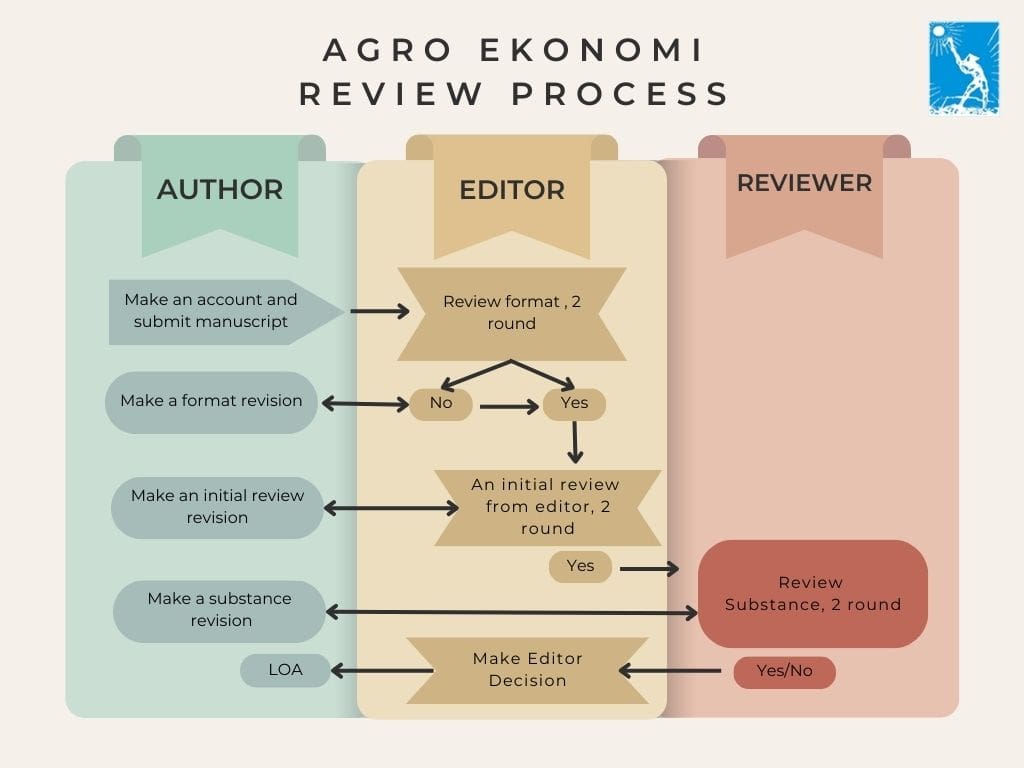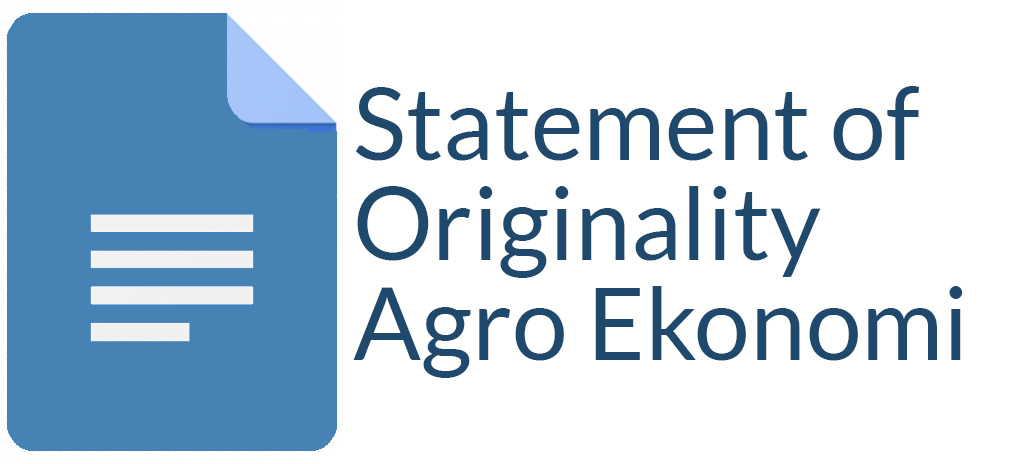Farmers’ Willingness to Continue Corporate Farming Programs in Jetis Subdistrict, Bantul Regency, Yogyakarta
Putri Perdana(1), Jamhari Jamhari(2*), Irham Irham(3)
(1) Department of Agricultural Socio-Economics, Faculty of Agriculture, Universitas Gadjah Mada
(2) Department of Agricultural Socio-Economics, Faculty of Agriculture, Universitas Gadjah Mada
(3) Department of Agricultural Socio-Economics, Faculty of Agriculture, Universitas Gadjah Mada
(*) Corresponding Author
Abstract
Corporate Farming (CF) program is one of the innovations in the field of agricultural institution in realizing more effective and efficient farming through consolidation of paddy field. This program was carried out in Trimulyo Village, Jetis Sub-district, Bantul Regency with Barokah Farmers Group as a pilot project. This study aimed to (1) determine farmers’ willingness to continue the CF program and (2) determine the factors that affect farmers’ willingness to continue the CF program. The study was conducted by surveying 52 smallholder farmers, members of Barokah Farmers Group who joined the CF program. The data were analyzed by using proportion test and Ordinary Least Square (OLS) model. The results showed that the farmers' willingness to continue the CF program was 66.54%. Attitudes towards private property rights, interaction among the members of farmer group, family member support, age and education were the factors that affect farmers' willingness to continue the CF programs. Farmers’ willingness to continue the CF program was categorized as high. Socialization and a more intense mentoring on the objectives of the CF program can increase farmers' willingness to continue the program.
Keywords
Full Text:
PDFReferences
Allahyari, M. S., Damalas, C. A., Daghighi Masouleh, Z., & Ghorbani, M. (2018). Land consolidation success in paddy fields of northern Iran: An assessment based on farmers’ satisfaction. Land Use Policy, 73(January), 95–101. https://doi.org/10.1016/j.landusepol.2018.01.035
Anwar, M. I. (2015). Skala Pengukuran Variabel-Variabel Penelitian. Bandung: ALFABETA.
Armstrong, A., & Stedman, R. C. (2012). Landowner willingness to implement riparian buffers in a transitioning watershed. Landscape and Urban Planning, 105(3), 211–220. https://doi.org/10.1016/j.landurbplan.2011.12.011
Azwar, S. (1999). Dasar-Dasar Psikometrik. Yogyakarta: Pustaka Pelajar.
Bose, A. K. (2013). Issues of Landlessness, Contract and Corporate Farming. Journal of Land and Rural Studies, 1(1), 25–39. https://doi.org/10.1177/2321024913483037
Brown, J. (2006). Social Psychology. Washington-DC: McGraw-Hill Humanities/Social Sciences/Languages.
Fischer, S., & Wollni, M. (2018). The role of farmers’ trust, risk and time preferences for contract choices: Experimental evidence from the Ghanaian pineapple sector. Food Policy, 81(October 2017), 67–81. https://doi.org/10.1016/j.foodpol.2018.10.005
Hiironen, J., & Riekkinen, K. (2016). Agricultural impacts and profitability of land consolidations. Land Use Policy, 55, 309–317. https://doi.org/10.1016/j.landusepol.2016.04.018
Jan, I., & Akram, W. (2018). Willingness of rural communities to adopt biogas systems in Pakistan : Critical factors and policy implications. Renewable and Sustainable Energy Reviews, 81(June 2017), 3178–3185. https://doi.org/10.1016/j.rser.2017.03.141
Kasijadi, F., Suryadi, F., & Suwono. (2003). Pemberdayaan petani lahan sawah melalui pengembangan kelompok tani dalam perspektif Corporate Farming di Jawa Timur. Jurnal Pengkajian Dan Pengembangan Teknologi Pertanian, 6(2), 117–130.
Musthofa, I., & Kurnia, G. (2018). Prospek Penerapan Sistem Corporate Farming. AGRISEP, 16(1), 11–22. https://doi.org/10.31186/jagrisep.17.1.11-22
Perwitasari, H., Irham, I., Hardyatuti, S., & Hartono, S. (2018). Farmers’ Willingness to Continue Landscape Integrated Pest Management Programs in Central Java and East Java Indonesia. 172(FANRes), 15–19. https://doi.org/10.2991/fanres-18.2018.4
Pickford, H. C., Joy, G., & Roll, K. (2016). Psychological Ownership Effects and Applications. In Mutuality in Business (p. 25). Oxford: Saïd Business School and University of Oxford.
Pierce, J. L. ., Kostova, T., & Dirks, K. T. (2001). Toward a Theory of Psychological Ownership in Organizations. The Academy of Management Review, 26(2), 298–310. Retrieved from https://www.jstor.org/stable/259124
Sardianou, E., & Genoudi, P. (2013). Which factors affect the willingness of consumers to adopt renewable energies ? Renewable Energy, 57, 1–4. https://doi.org/10.1016/j.renene.2013.01.031
Simanjuntak, O. V., Subejo, S., & Witjaksono, R. (2016). Partisipasi Petani Dalam Program Gerakan Penerapan Pengelolaan Tanaman Terpadu Padi Di Kecamatan Kalasan Kabupaten Sleman. Agro Ekonomi, 27(1), 20. https://doi.org/10.22146/jae.22693
Susanti, D., Listiana, N. H., & Widayat, T. (2016). Pengaruh umur petani, tingkat pendidikaan dan luas lahan terhadap hasil produksi tanaman sembung. Jurnal Tumbuhan Obat Indonesia, 9(2), 75–82. Retrieved from http://ejournal.litbang.depkes.go.id/index.php/toi/article/view/7848/5318
Swain, P. K., Kumar, C., & Kumar, C. P. R. (2012). Corporate Farming vis-a-vis Contract Farming in India : A Critical Perspective. International Journal of Management and Social Sciences Research (IJMSSR), 1(3), 60–70.
Wahyuni, S., & Pranadji, T. (2015). Konsep, implementasi, dan faktor penentu keberhasilan program konsolidasi usahatani. Jurnal Manajemen & Agribisnis, 12(1), 14–26. https://doi.org/10.17358/JMA.12.1.14
Wongkar, D. K. R., Wangke, W. M., Loho, A. E., & Tarore, M. L. G. (2016). Hubungan Faktor-Faktor Sosial Ekonomi Petani dan Tingkat Adopsi Inovasi Budidaya Padi di Desa Kembang Mertha, Kecamatan Dumoga Timur, Kabupaten Bolaang Mongondow. Agri-Sosioekonomi, 12(2), 15–32.
Article Metrics
Refbacks
- There are currently no refbacks.
Copyright (c) 2018 Agro Ekonomi

This work is licensed under a Creative Commons Attribution-ShareAlike 4.0 International License.
View My Stats











